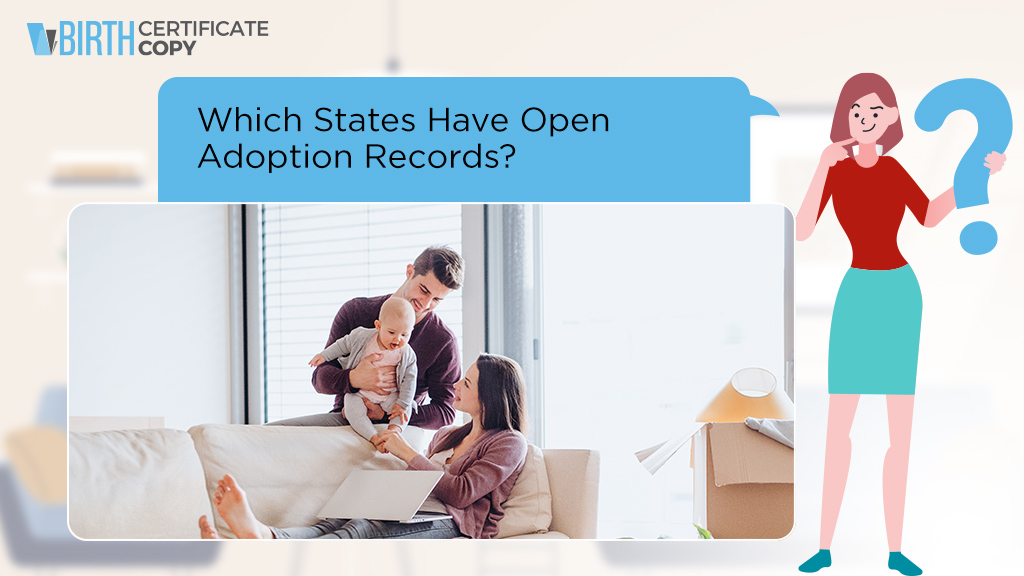Open adoption records provide valuable information and facilitate connections for individuals involved in the adoption process. However, access to these records varies across states in the United States. This article explores which states have open adoption records, as well as provides guidance on obtaining your original birth certificate (OBC) in states with restricted access. Understanding the legal landscape and processes in each state is crucial for adoptees seeking to uncover their origins and establish meaningful connections with their biological families.
What are open adoption records?
Open adoption records encompass documents that offer insights into the adoption process, birth parents, adoptive parents, and the adopted child. They may include medical histories, original birth certificates, court documents, and other relevant information. Access to these records is essential for adoptees, as it contributes to their sense of identity, provides medical background information, and fosters connections with biological family members.
The importance of open adoption records
Open adoption records hold significant value, as they empower adoptees to understand their heritage, access vital medical information, and establish relationships with their birth families. By having access to these records, adoptees can gain a deeper understanding of their personal history and develop a sense of belonging
States with open adoption records
While adoption laws differ from state to state, several states have adopted more open policies regarding adoption records. The following states are known for having open adoption records:
- Alabama: Alabama has relatively open adoption records, allowing adult adoptees who are 19 years or older to request their original birth certificates.
- Alaska: Alaska has a relatively open adoption records policy. Adult adoptees who are 18 years or older can access their original birth certificates.
- Kansas: Kansas has open adoption records, allowing adult adoptees who are 18 years or older to access their original birth certificates.
- Maine: Maine has relatively open adoption records, granting adult adoptees who are 18 years or older the right to access their original birth certificates.
- California: California is among the states with relatively open adoption records. In 2018, legislation was passed allowing adult adoptees to access their original birth certificates, providing them with crucial information about their biological origins.
- Oregon: Oregon also supports open adoption records. Adult adoptees in the state can request their original birth certificates, granting them access to important details about their birth parents.
- New Hampshire: New Hampshire has made progress in opening adoption records. Since 2005, adult adoptees have had the right to access their original birth certificates, enabling them to gain a clearer understanding of their biological background.
- Rhode Island: Rhode Island has taken steps toward open adoption records. Since 2012, adult adoptees have had the ability to access their original birth certificates, facilitating the exploration of their birth parents’ identities and heritage.
- Tennessee: Tennessee has open adoption records, permitting adult adoptees who are 21 years or older to request their original birth certificates.
Obtaining your OBC in states with restricted access
In states with restricted access to adoption records, the process of obtaining your original birth certificate can be more challenging. However, it’s important to note that adoption laws evolve over time, and policies may change, potentially granting individuals greater access to their adoption records. To navigate the process effectively in states with restricted access, consider the following steps.
a. Research state laws: Familiarize yourself with the specific adoption laws in your state. Understand the restrictions, requirements, and any available legal avenues for accessing your OBC.
b. Seek legal assistance: Consult an adoption attorney or a legal professional specializing in adoption matters. They can provide guidance and help navigate the legal processes involved in obtaining your OBC.
c. Explore search and support groups: Join adoption search and support groups or online communities that focus on your specific state. These groups often provide valuable insights, resources, and guidance based on the experiences of others who have navigated similar situations.
d. Contact adoption agencies: Reach out to the adoption agency involved in your adoption. While they may not be able to provide access to your OBC directly, they might offer guidance or information that could assist you in your search.
e. Consider DNA testing: DNA testing services, such as AncestryDNA or 23andMe, can help connect you with biological relatives. By submitting a DNA sample, you may discover matches that lead you to your birth family or provide.
Most states require consent from the birth parents to release identifying information unless the adoptee or their legal guardians have a court order.
Since birth record regulations vary so much, it’s important to check official sources to learn more about your state’s laws, so you can learn more about how to access your birth records.

